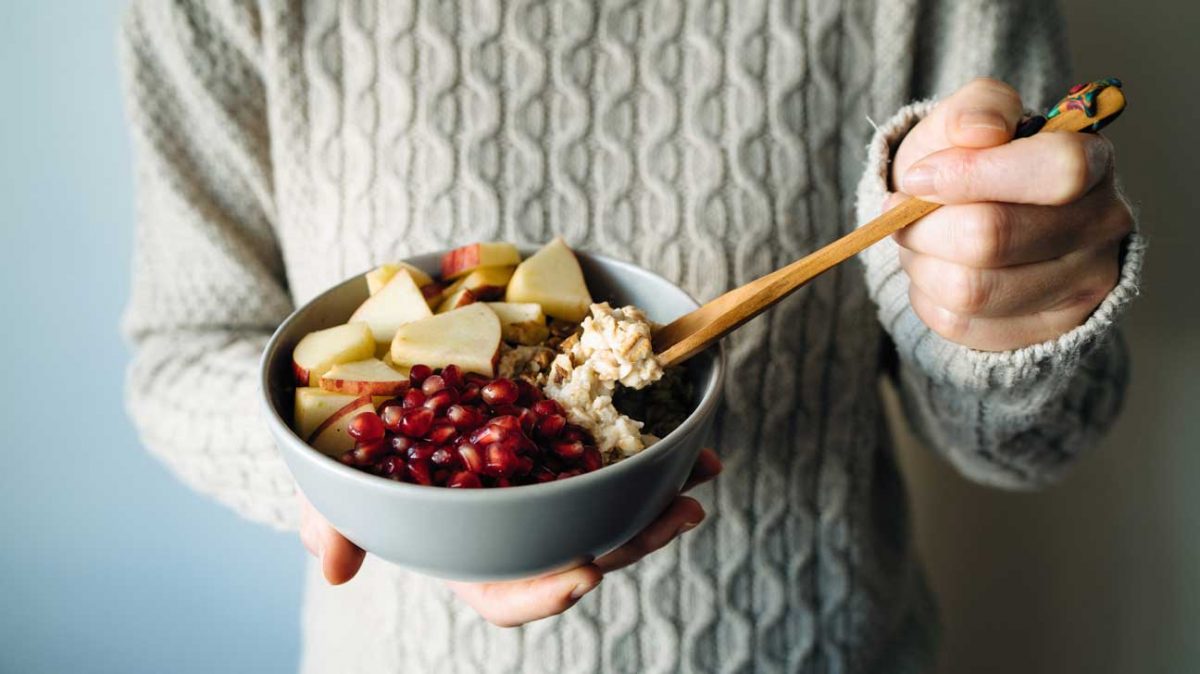Any running is good running. Whether it’s training for a marathon, taking a light jog, or doing sprints, the health benefits of kicking into higher gear are huge. So how do you best optimize them? Most people have their pre-run regimen down—specifically what they’ll be eating before a run or competition. This is important, of course, but what you eat after a run is equally vital for recovery. The average post-run routine generally goes something like this: stumble through the door, sweat a bit, sit down, head for the shower. What’s missing here is the refuelling stage. You need to recoup what you drained.
Depending on your goals—i.e. training for a marathon or just logging more consistent weekly miles—what you eat after a run should aim to refuel, rebuild, and rehydrate to aid the recovery process and maximize the training effect. The focus of post-run nutrition should be on replenishing glycogen (stored energy), repairing the damage caused to your muscles, and replacing lost nutrients and minerals like electrolytes.
Here are three guidelines to follow when figuring out what to eat after a run:
- Focus on complex carbohydrates to replenish glycogen stores in your liver and muscles: The recommended amount is 0.5-0.7 grams of carbs per kg of body weight within 30 minutes after training—for glycogen resynthesis.
- Replace electrolytes, mineral, and water that you lost in sweat: Hydration is key since your body and muscles are mainly water. Just a 2 percent weight loss from sweat can cause performance and cognitive decrements. Although sweat rates and sweat sodium concentrations are highly individualized, look to add some sodium and chloride as those are the two main electrolytes lost in sweat. Factor in plenty of water too. About 16 fluid oz per pound of H2O will be lost during your run.
- Rebuild and repair your muscles that were damaged during your run: Adding some post-run protein to your diet has been shown to help with the uptake of carbs into muscle. Aim for 0.14-0.23 grams of protein per pound of body weight. Look for a 3:1 or 4:1 carbohydrate-to-protein ratio within 30 minutes. Don’t wait longer than two hours to re-nourish.
1. Chocolate Milk
Chocolate milk takes the top spot here because it happens to be the perfect post-run drink. It’s loaded with high quality protein and those quick digesting carbs for muscle recovery and glycogen synthesis. Low-fat chocolate milk already has a 4:1 carb to protein ratio and is probably the most researched post-workout recovery option on this list for superior exercise-recovery benefits. Lactose intolerant? Go lactose-free while still reaping all the benefits.
2. Greek Yogurt with Berries and Honey
Greek yogurt is superior to traditional yogurt as it’s much higher in protein—with ⅔ cup providing 15 grams of protein compared to around 5 grams for the same amount of regular yogurt. Top this with mixed berries and honey for some quick digesting carbohydrates and antioxidants for muscle recovery.
3. Eggs and Toast
Each egg has around 6-7 grams of high quality protein. Cook up two or three of them in a few minutes, place on a couple slices of whole grain bread for high quality carbs—and do the math. You’re all set.
4. Avocado Toast with Poached Eggs
Start with a whole grain, high protein bread option like Dave’s Killer Bread, then mash some avocados with salt and pepper for healthy fats and some sodium and chloride for electrolytes. Top with a couple of poached eggs (fried or scrambled is fine) for your protein.
5. Salmon, Sweet Potatoes, and Asparagus
Salmon is not only a great protein source but it also offers exercise recovery benefits as it’s rich in healthy, inflammation-fighting omega-3 fatty acids. Pair your fish with sweet potatoes or brown rice to add some carbohydrates. Add asparagus or broccoli to round out a complete post-run meal.
6. Tuna and Whole Grain Crackers
Tuna is convenient to eat anywhere after your run. I especially love those extra-portable tuna pouches. Rip ’em open and there’s your easy 24-25 gram protein snack. Pair with some whole grain crackers for quality carbs.
7. Cottage Cheese with Pineapple
Cottage cheese is a great protein source, providing both whey protein (faster digesting) and casein protein (slower). One cup of cottage cheese provides 28 grams of protein—plus its sodium content will help replenish lost electrolytes. Add a favorite fruit (I go with pineapple) to provide an extra simple carb boost.
8. English Muffin or Bagel with Nut Butter and Banana
Choose a whole grain English muffin or bagel for an easy-to-digest high quality carb source with some healthy fiber. Top it with nut butter (check out Nooty high protein nut spreads), a sliced banana, and drizzle of honey.
9. Protein Oatmeal with Blueberries and Peanut Butter
Oatmeal is a high quality carb source and rich in a soluble fiber called beta-glucan which benefits digestion and gut health. Prepare your oats with milk and add ½ to 1 scoop of your favorite whey protein powder. Top with blueberries and blackberries which provide strong antioxidant compounds called flavonoids that aid recovery. Round it out with peanut butter for some healthy fat.
10. DIY Protein Shake
Protein shakes have long been the staple for post-workout recovery—especially for building muscle. It’s also the perfect elixir for post-run recovery. Get creative with your shakes. There are a ton of protein options (whey, plant-based, nut butter, Greek yogurt, etc) and the fruit selection (bananas, berries, pineapples, mangos, etc.) also runs the gamut. Sneaking in some added nutrition like spinach, kale, or avocados will win you extra points. Here’s my perfect post-run recovery smoothie recipe:
Berry Good Recovery
Ingredients:
- Strawberries, frozen | 1/4 Cup
- Raspberries, fresh | 1/4 Cup
- Blueberries, fresh | 1/4 Cup
- Cheribundi Tart Cherry Juice | 1/2 Cup
- Water | 1/2 Cup
- Avocado | 1/8
- Athletic Greens Powder | 1 Scoop
- Vanilla Protein Powder | 1-2 Scoops
Directions:
Add all ingredients except protein powder to the blender and blend on low. Then protein powder and re-blend until smooth consistency.
Nutrition
- 292 Calories
- 34g Carbs
- 25g Protein
- 7g Fat









